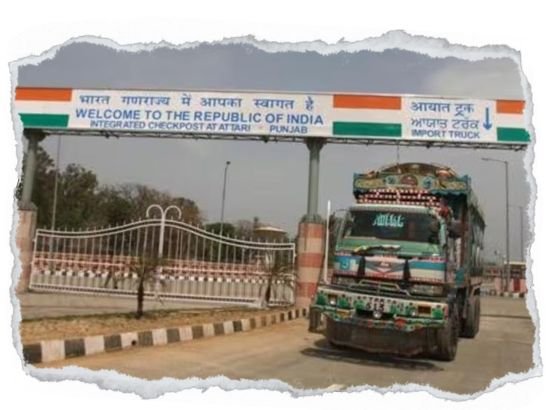
In a significant humanitarian gesture, India has allowed 160 Afghan trucks carrying dried fruits and other goods to enter the country through the Attari-Wagah border. This development comes just days after the first formal political conversation between India and the Taliban regime, signaling a subtle shift in diplomatic engagement amid ongoing regional tensions.
On Thursday, Indian External Affairs Minister S. Jaishankar held a telephone conversation with Afghanistan’s Acting Foreign Minister Amir Khan Muttaqi. This marked the first official political dialogue between New Delhi and the Taliban leadership since the latter’s return to power in Kabul. The call took place ahead of Muttaqi’s scheduled visits to Iran and China, reflecting India’s willingness to cautiously reengage.
Just a day after the conversation, India granted special permission for 160 Afghan trucks to cross the Attari border. Sources revealed that Pakistan had initially delayed customs clearance at the Wagah checkpoint. However, by Friday, several trucks were allowed to unload their goods at the Attari terminal.
India had suspended cross-border trade and transit facilities with Pakistan on April 24, following a terrorist attack in Pahalgam, Kashmir, that killed 26 people. New Delhi held Islamabad responsible for the assault, leading to heightened tensions and the shutdown of the Attari-Wagah border. Despite this freeze, India made an exception for Afghan trade, underscoring its commitment to humanitarian support.
India remains Afghanistan’s largest export market in South Asia, with bilateral trade valued at approximately $1 billion. Dried fruits, apples, and other agricultural produce are among the key imports from Afghanistan. The Attari-Wagah route serves as the most cost-effective and fastest corridor for overland trade between the two countries. Prior to the border closure, around 40–45 Afghan trucks entered India daily through this route.
Following the April shutdown, Pakistan had allowed 150 Afghan trucks—those that had entered its territory before April 25—to proceed toward India. This time again, Islamabad permitted limited truck access based on requests from the Afghan Embassy. However, the broader trade and people-to-people movement between India and Pakistan remains under strict suspension.
Since 2021, India has provided Afghanistan with 50,000 tonnes of wheat, 350 tonnes of medicines, 40,000 liters of Malathion (a pesticide), and 28 tonnes of earthquake relief supplies. Additionally, 2,000 Afghan students have been awarded online scholarships by Indian institutions. Afghan authorities have acknowledged and appreciated India’s continued support during these challenging times.
Following the Pahalgam attack, the Taliban publicly condemned the violence and expressed solidarity with India. They also refuted Pakistan’s allegations that Indian missiles had been launched into Afghan territory. Earlier this year, Indian Foreign Secretary Vikram Misri met with Muttaqi in Dubai, hinting at India’s intention to resume development projects in Afghanistan.
India has also indicated that it is considering extending humanitarian aid to Afghan refugees who have been expelled from Pakistan. However, recognizing the Taliban regime officially remains contingent on broader international consensus. Global actors continue to press the Taliban for inclusive governance and the lifting of restrictions on women and girls.